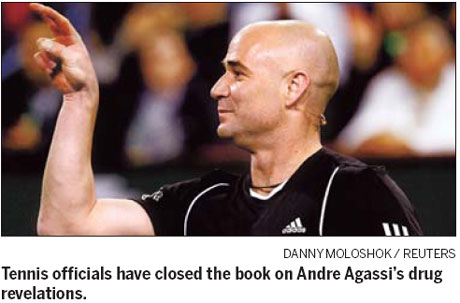Tennis
Agassi drug inquiries dropped
(China Daily)
Updated: 2010-03-19 09:08
 |
Large Medium Small |

ROME - Tennis officials have closed the book on Andre Agassi's drug revelations.
International Tennis Federation (ITF) president Francesco Ricci Bitti said on Wednesday that despite appeals from the World Anti-Doping Agency, the statute of limitations in the case expired long ago and no retroactive punishment was possible.
In Agassi's recently published autobiography, Open, he wrote he took crystal meth in 1997 and lied to the ATP to avoid a suspension after failing a doping test.
The statute of limitations in the case was eight years. "The ATP is the only entity that could have shed light on what happened, but it's too late," Ricci Bitti said. "WADA asked information from the ATP without much success. As a member of WADA's executive committee, I'm obviously very disappointed that Agassi - such a great and emblematic player - decided to make these revelations.
"I'm sure he had his reasons, which were not easy to understand ... there were a lot of strange reasons involved. From a sports point of view, it's very unfortunate. I think what he did hurt our sport."
The suspensions were lifted in December after the players appealed to a Belgian court and both still have appeals pending with the Court of Arbitration for Sport. Wickmayer also has taken her case to the European Commission and the European Court for Human Rights.
"It's a very important case because it could have consequences resulting in the revision of the WADA code," said Ricci Bitti, who is also an International Olympic Committee member.
Wickmayer claims she was not properly informed of the online reporting requirements for drug-testing that led to her ban.
Under WADA rules, elite athletes must be available for out-of-competition testing for one hour a day, 365 days a year. They must give three months' notice of where they will be so they can be tested.
Meanwhile, regarding recent talk from some players and promoters calling for a tennis World Cup, he reiterated the ITF is not about to abandon the Davis Cup.
"Everyone has the right to bring in new ideas but the players have to understand the Davis Cup is part of tennis' history, just like the Grand Slams, and it should be respected," he said. "That doesn't mean the international federation isn't open to new ideas."
Associated Press












